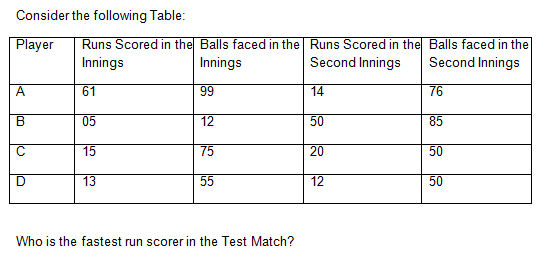Question
In the question below some statements are given
followed by four conclusions I, II, III and IV. You have to take the given statements to be true even if they seem to be at variance with commonly known facts. Read all the statements and then decide which of the given conclusion definitely follows from the given statements, disregarding the commonly known facts. Statements: Few Lamp is Post. All Post is Lighter. No Post is Cook. All Cook is Top. Conclusions: I. Few Lighter is not Cook. II. No Post is Top. III. Few Top is Lighter. IV. Few Lamp is Lighter.Solution
No Post is Cook (E) → Conversion → No Cook is Post (E) + All Post is Lighter (A) → Some Lighter are not Cook (O*). Hence conclusion I follows. No Post is Cook (E) + All Cook is Top (A) → Some Top are not Post (O*). Hence conclusion II does not follow. Some Lighter are not Cook (O*) + All Cook is Top (A) → No conclusion. Hence conclusion III does not follow. Some Lamp is Post (I) + All Post is Lighter (A) → Some Lamp are Lighter (I). Hence conclusion IV follows.
Consider two Statement and a Question :
Statement - 1: Priya is 4 ranks below Seema and is 31st from the bottom.
Statement - 2: En...
A man completes 7/8 of a job in 21 days. How many more days will it take him to finish the job if quantum of work is further increased by 50%?
X and Y run a 3 km race along a circular course of length 300 m. Their speeds are in the ratio 3:2. If they start together in the same direction, how m...
The increase in the price of a certain item was 25%. Then the price was decreased by 20% and then again increased by 10%. What is the resultant increas...
Consider the following multiplication problem:
(PQ) × 3 = RQQ, where P, Q and R are different digits and R # 0.
What is the value of...
In the English alphabet, the first 4 letters are written in opposite order; and the next 4 letters are written in opposite order and so on; and at th...

What is the value of X in the sequence 20, 10, 10, 15, 30, 75, X?
Consider the following statements :
1. The sum of 5 consecutive integers can be 100.
2. The product of three consecutive ...
A person X wants to distribute some pens among six children A, B, C, D, E and F. Suppose A gets twice the number of pens received by B, three times tha...
Relevant for Exams:



